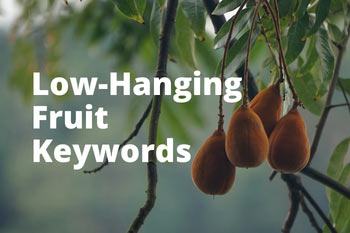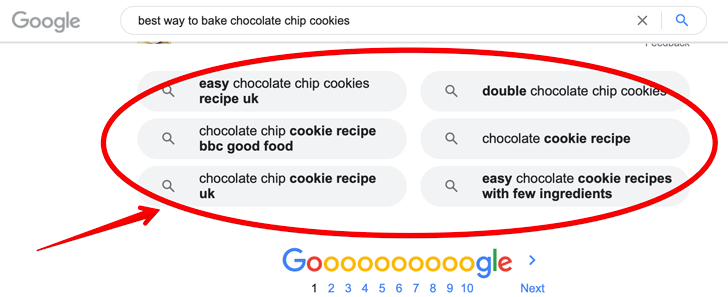With close to two trillion indexed keywords online, selecting the perfect keyword to rank (and more importantly convert) is a challenging task. What are long-tail keywords and how should we apply them?
Bloggers, affiliate marketers, e-commerce owners...Anyone who's looking to drive organic traffic is required to have a certain level of SEO skill. Sometimes it might feel like you're shooting in the dark, but in this blog post, I will explore how to select phrases that are low-hanging fruit and put your best foot forward.

What Are Long Tail Keywords?
Long-tail keywords are more specific phrases than short-tail keywords and usually have a longer length. They are less competitive and therefore may be a better choice for your SEO strategy. For example, instead of targeting the words “Terre D’Hermes”, you could target the phrase “Terre D’Hermes men 100ml”.
While long-tail keywords may not get as much traffic as shorter, more general keywords, they can be a good way to get started with SEO because they are less competitive.
Your goal is to target the right long-tail keywords, meaning less competitive but reasonably popular phrases, to drive the maximum possible amount of traffic and also the traffic that is more likely to convert.
How To Identify Long-Tail Keywords
Keyword research is probably the most essential element of SEO. That’s because keywords are how you tell search engines what your website is about, and how you want it to rank in the search results.
If you want your website to rank for highly competitive keyphrases, you’re going to have a lot of work ahead of you. However, if you focus on long-tail keywords, you can often get your website to rank much more easily.
There are a few reasons why targeting long-tail keywords can be beneficial for your website:
- The use of long-tail keywords can get your webpage easier to rank. This is because there is less competition for these phrases, so it can be easier to get your website to the top of the search results.
- Long tail keywords can be more targeted and relevant to your website visitors. If someone is searching for a very specific keyword, it’s more likely that they’ll find your site.
What’s The Difference Between Long-Tail Keywords and Low-Hanging Fruit Keywords?

In the world of SEO, there are two types of keywords that you will come across: long-tail keywords and low-hanging fruit keywords. So, are you wondering what the difference is between long-tail keywords and low-hanging fruit keywords? If so, you're not alone. Many people are confused about the difference between these two terms.
Long-tail keywords are phrases that are more specific and usually longer than low-hanging fruit keywords. They tend to be less competitive, and therefore may be easier to rank for in search engine results pages (SERPs).
Low-hanging fruit keywords, on the other hand, are shorter and more general. They are also more competitive, which means they may be more difficult to rank for.
Why is this important?
Well, if you're trying to rank for a highly competitive keyphrase, then you'll have a hard time getting to the top of the search results. However, if you target a long-tail phrase, you'll have a much better chance of ranking because there's less competition.
So, which type of keyphrases should you be targeting? Well, it depends on your goals. If you're just starting out with SEO and want to see some quick results, then low-hanging fruit keywords may be a good option. But if you're looking to build long-term organic traffic, then long tail keywords are essential.
In other words, long-tail keywords are like low-hanging fruit. But they can be easier to rank for and they can help you get more traffic to your website.
So, if you're looking to increase your traffic and get more leads or sales, then you should focus on long-tail keywords. not low-hanging fruit keywords. This technique is simple and it could help you rank for highly relevant search terms and get more traffic to your website.
What Do You Advocate?
How To Apply Long-Tail Keywords To Your Content
SEO is constantly changing, which means that what worked before may not work now. In order to stay ahead of the curve, it's important to understand and use long-tail keywords. By targeting these more specific terms, you can improve your chances of ranking high in search results.
Here are some tips for using long-tail keywords in your content:
1. Identify Your Target Audience
Knowing who your audience is is the first step toward creating content that resonates with them. Identifying your target audience will inspire you to find the right keywords to use.
2. Do Your Research
Once you know who your target audience is, it's time to do some research. Use keyword tools like Google AdWords Keyword Planner and Moz Keyword Explorer to find long tail keywords that are relevant to your niche.
3. Use Keywords Throughout Your Content
Once you've identified a few relevant key phrases, make sure to use them throughout your content. This includes the title, meta tags, body copy, and images. Using the words sparingly will help you avoid being penalised for keyword stuffing.
4. Monitor Your Progress
Use Google Analytics to track how your page is performing. Is the page getting any visitors? How long are they staying on your page, and what’s the bounce rate? If the page does not seem to perform as well as you expected, you can edit the content and add some new keyword-related information. Keep monitoring.
The Best Long Tail Keyword Tools
There are a number of great long-tail keyword tools out there that can help you find the right phrases for your blog or website. I would strongly recommend you use a premium keyword tool. Although there are some free keyword tools, most of them give you only partial access or don’t give you accurate results. The prices of paid tools vary. Here are some of the best:
Mangools:
Mangools is one of our most recommended tools. You can check the review here.
Jaaxy:
Jaaxy is another great research tool. It’s part of a very successful affiliate marketing package, Wealthy Affiliate. But you can also use it as a stand-alone. You can check the review here.
30 x premium keyword searches for FREE with Jaaxy
Google Keyword Planner:
This is a free tool from Google that allows you to research keywords for your website or blog. Simply enter a phrase into the planner and it will provide you with data on how often people search for that term, as well as related keywords.
SEMrush:
This is a paid tool that offers a free trial. It provides detailed data on keyword searches, including those made on mobile devices and in different languages.
KWFinder:
This is another paid research tool with a free trial. It offers data on average monthly searches, as well as the difficulty of ranking for a given keyword.
Long Tail Pro:
Long Tail Pro is also a paid research tool that offers a free trial and a money-back guarantee. It provides detailed data on keyword searches, competition, and more.
Moz Keyword Explorer:
This is a free tool from Moz that offers data on monthly searches, competition, and more.
You may want to remember that not all keyword research is created using the same measurement or format. Ones that are recommended by advanced users may be too complicated and overwhelming, not easily affordable, and don’t necessarily give you the best results. I suggest that you try several different tools listed above, and choose the one you think is the most suitable for you. This way, you will avoid wasting a lot of time in the long run and it will keep you focused on creating content for your blog.
Blogging Best Practice - Keyword Stuffing
Don't stuff your keywords!
If you're new to the world of SEO, you may have heard the term 'keyword stuffing' thrown around. Keyword stuffing is a black hat SEO tactic that involves cramming as many keywords as possible into your content in an attempt to improve your search engine ranking.
It's a common blogging mistake, especially for new bloggers who are anxious to rank high in search engine results. Despite the fact that keyword stuffing is against Google's guidelines (Irrelevant keywords), some people still try to do it because they think it will help their website rank higher. However, all it does is make your content difficult to read and it can actually hurt your ranking. So if you're thinking about doing it, don't!
But writing for humans, not algorithms, is what will get you the readership and engagement you're looking for. So keep it natural and focus on creating informative, creative content - your readers will thank you for it, and so will your search engine ranking.
What Kind of Content Are You Targeting?

If you want to get the most out of your long-tail keywords, you need to make sure that you're targeting the right kind of content. That means creating content that is relevant to your phrase and that will appeal to your target audience.
- Think about what kinds of topics your target audience is interested in and what kinds of questions they're likely to have.
- Once you know this, you can begin to research which keywords will be the most effective for reaching your target reader.
- Then, create content that addresses those topics and questions. If you can provide useful information that helps your target audience solve a problem, you're more likely to get their attention.
Are Short-Tail Keywords Ever Useful?
Because all the marketers talk about focusing on long-tail keywords, they may seem to be the best option regardless, but this isn’t necessarily true.
If you are creating evergreen content and looking to build your site as a good authority site, your webpage with short-tail keywords will come back as a top-ranking page in the future.
Google Search Keyword Suggestions
Ultimately, the best way to determine which keyphrase will work best for you is to experiment with a variety of questions that are asked by users on Google searches and write multiple blog posts. Here are the steps to do this exercise;
- First, find the best long-tail keywords suggested by your search tool.
- Search the keywords on Google.
- Other keyword suggestions will come up.
- Go back to your keyword tool and search for each one.
- If any of them seems reasonably good (good monthly search number and low competition rate), write a separate blog post using that particular keyphrase.

For example, if you enter the long-tail phrase, "best way to bake chocolate chip cookies" on Google search and scroll the page right down, you will see several suggested phrases such as;
- "easy chocolate chip cookies recipe"
- "double chocolate chip cookies"
- "easy chocolate cookie recipe with few ingredients", etc.
SEO Discussion Forums About Keywords
SEO, especially with regard to long-tail keywords has been discussed by millions of bloggers and affiliate marketing experts. There is no doubt that having high-quality, content-based discussions will yield excellent results for your business. However, discussions are often about Google that’s constantly changing its search algorithm and it’s hard for beginners to keep up.
With that said, It is still important for you to engage in discussion about the keyword topics relevant to your industry, customer base, and blog niche. What's more, you may learn a lot from the experts at the beginning but you will soon be in a position where you teach your keyword-search techniques to the newbies in the community forums.
This way, they get to know and trust you even more as a resource on the topics that matter most to them. If you do decide to take part in online discussions, be as you are and take all the tips positively.
What Are Long-Tail Keywords? Conclusion
As you can see, long-tail keywords are an important part of SEO. If you want to rank for a certain keyword, proactively search for several long tail keyword variations and decide which one’s the best for your content each time you write. And remember, don’t stuff your content with too many of the same phrases. This will only result in a lower-quality article. Instead, focus on writing quality content and include a few long-tail keywords here and there.
